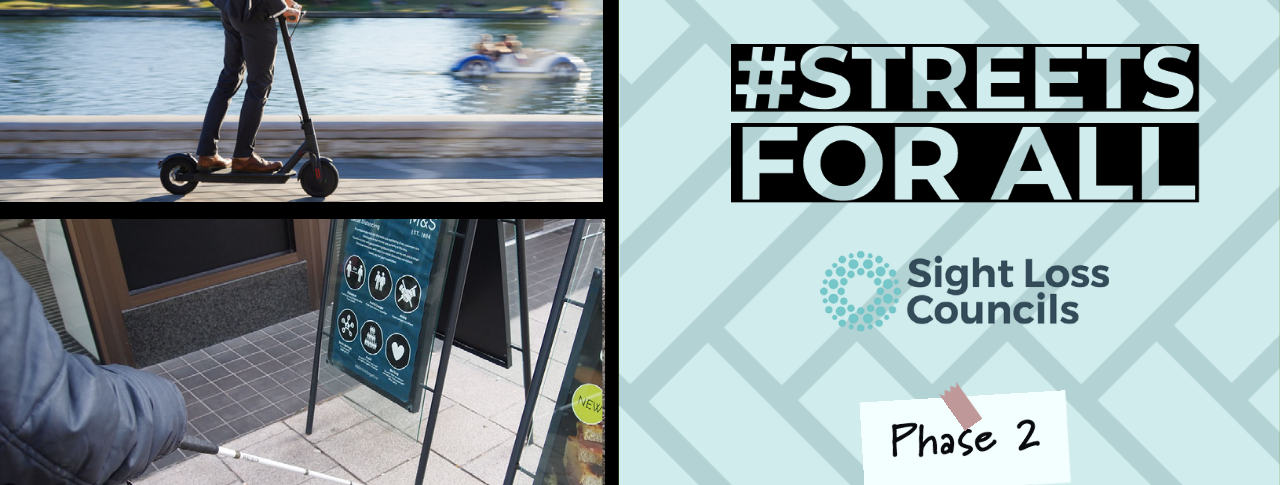#StreetsForAll: Making streets safer for blind and partially sighted people
Sight Loss Councils (SLCs) have been campaigning over the last eight months to make our public spaces safer with our #StreetsForAll campaign.
We launched the campaign in October 2020 and have raised awareness of the dangers e-scooters, cluttered pavements, and pavement parking pose for visually impaired pedestrians.
e-scooter safety concerns
E-scooters are fast, heavy and difficult to hear. Many people ride these on pavements, so there are serious concerns about the risk of collisions with blind or partially sighted pedestrians. In addition, e-scooter trials operating dockless parking models have seen e-scooters simply abandoned across pavements, creating a real danger for visually impaired people to try to navigate through. Combined, these have eroded the confidence of many blind and partially sighted people to navigate their cities and towns independently.
Mike Bell, National Public Affairs Lead for Sight Loss Councils, said:
“Working with Thomas Pocklington Trust, we have responded to this challenge locally and nationally. We have worked with RNIB, Guide Dogs, Visionary and London Vision to create sector guidance for local councils and e-scooter operators, based on the concerns of blind and partially sighted people and the actions we wanted them to take. This has been key in improving outcomes for individual local trial schemes and setting the standard that operators should aspire too.We have also looked to positively engage with e-scooter operators, highlighting concerns and pushing for changes.”
In June, we teamed up with e-scooter operator Voi to invite Birmingham City Council officials to wear simulation spectacles and experience the challenges e-scooters pose for blind pedestrians.
Our Greater Manchester Sight Loss Council worked with operator Lime to add in-app safety messages to make riders aware of visually impaired pedestrians. We also recently took part in the first meeting of Lime’s UK Disability Advisory board.
Mike Bell has also been a member of the UK Safety board led by e-scooter operator Tier and working with Sight Loss Council members has fed into the board’s interim safety report in a drive to improve the safety standards for e-scooters.
We have also worked closely with Tier Mobility on research to develop an acoustic Vehicle Alert System, due to launch at the end of 2021.
One common question we get asked is why Sight Loss Councils are not supporting an outright ban on e-scooters. In Mike’s recent letter published in the times, he makes it clear that not “all blind people hate e-scooters, we just need to listen to them” We welcome the environmental benefits of e-scooters, but the key safety features our campaign is calling for need to be made mandatory in order for e-scooters to be safe for everyone.
We are calling for:
● Mandatory on-road parking bays
● A reduction to the 15.5mph speed limit
● The installation of sound-emitting devices
● Geotagging to prevent pavement use.
Pavement parking
Pavement parking is a real danger to blind and partially sighted pedestrians. Cars parked on pavements often force visually impaired people into the road, risking danger from on-coming traffic.
October 2020, we asked our volunteers and supporters to write to their MPs and local councils, in support of a nationwide ban on pavement parking. This helped persuade dozens of MPs and councils to write to the Department for Transport calling for action.
In the Autumn of 2020, the Government launched a formal consultation, exploring options to tackle pavement parking. We encouraged blind and partially sighted people to write in with their views as part of that consultation. We are expecting the Government to announce its proposals this year and we will continue to influence and shape future laws.
Tackling increased street furniture
Sight Loss Councils have been tackling the issues posed by street furniture outside cafes and restaurants. Tables and chairs blocking pavements are causing physical barriers to visually impaired people’s independence.
Sight Loss councils have been calling on local authorities to sign up to a pledge calling for equality impact assessments to be carried out and greater consultation of disabled people when re-designing streetscapes.
Sunderland council announced in April their commitment to our pledge.
York Sight Loss Council recently invited city councillors and officials to ‘walk blind’ so they can experience the challenges outdoor street furniture poses for blind and partially sighted people.
Iain Mitchell, Engagement Manager for York Sight Loss Council said: “We were very pleased that local councillors and council officials spent the morning with us and were willing to try our simulation glasses to get a better understanding of the difficulties we encounter daily as visually impaired people.
“We are heartened they have agreed to address the issues so that business can continue to operate and blind, and partially sighted residents and visitors can get around the city safely.”
Mike believes the work of Sight Loss Council volunteers has been central in moving the campaign forward:
“Our volunteers have written to local councillors and MPs and met with e-scooter operators and local authorities. These actions have had a real impact in shaping the debate.”
Learn more about Sight Loss Council’s #StreetsForAll campaign and sign up to our email newsletter to get the latest updates on our work.
Publication date: 20 July 2021

